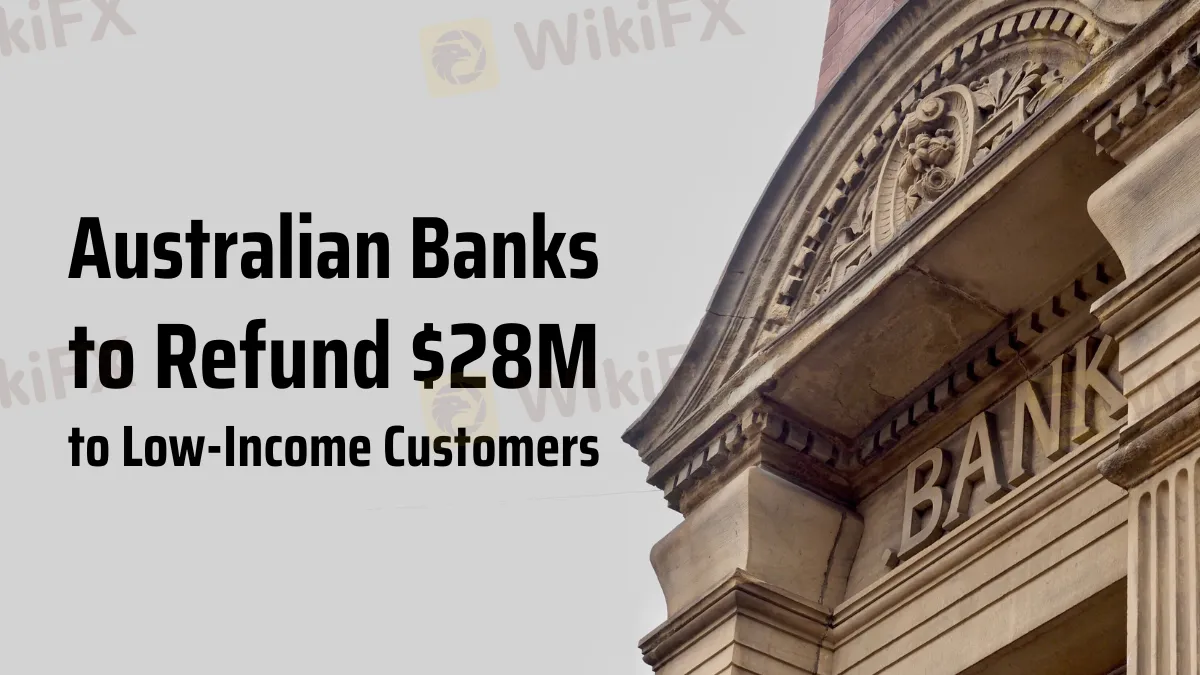简体中文
繁體中文
English
Pусский
日本語
ภาษาไทย
Tiếng Việt
Bahasa Indonesia
Español
हिन्दी
Filippiiniläinen
Français
Deutsch
Português
Türkçe
한국어
العربية
Australian Banks to Refund $28M to Low-Income Customers
Abstract:Four Australian banks will refund $28M to low-income customers, including First Nations individuals, after ASIC found many were kept in high-fee accounts.

Four central Australian banks, ANZ Bank, Bendigo and Adelaide Bank, Commonwealth Bank, and Westpac, have agreed to repay a total of $28 million to low-income clients, including First Nations people. This ruling follows an investigation by the Australian Securities and Investments Commission (ASIC), which discovered that these clients were held in high-fee bank accounts despite being eligible for lower-cost options.
The ASIC audit, issued today, revealed that more than two million consumers, many of whom receive Centrelink benefits, were paying excessive costs. Customers who receive particular government payments should be eligible for low-fee accounts, according to the banking code of practice. However, the analysis revealed that many of these low-income clients were stuck in high-fee accounts, drastically diminishing their savings.
According to Alan Kirkland, an ASIC commissioner, these hefty fees put a financial hardship on many consumers, particularly those in rural and isolated locations. These clients often struggled to manage their funds due to the banks' cumbersome procedures.
“Banks knew that many of these customers on low incomes were in inappropriate high-fee accounts,” claims Kirkland. He pointed out that prior to the study, banks only provided cumbersome “opt-in” procedures for clients to convert to low-fee choices, forcing some to drive long distances to the closest branch.
While banks had processes in place to identify consumers who were likely to be eligible for reduced-fee accounts, their attempts to convince these customers to transfer may have been more successful, with success rates as low as 0.5%.
In response to ASIC's findings, the banks have pledged to convert more than 200,000 clients to low-fee accounts, which are estimated to save them around $10.7 million annually. Over the next 12 to 18 months, banks will refund more than $28 million in fees, with $24.6 million going directly to those receiving ABSTUDY payments—a support scheme for Aboriginal or Torres Strait Islander students or apprentices—and those living in areas with significant First Nations populations.
Kirkland stressed the need of banks to do more to avoid such concerns from occurring in the future. “Banks need to ensure they have systems and processes in place, so customers on low incomes can easily transition to low-fee accounts, regardless of their location,” he told us.

Disclaimer:
The views in this article only represent the author's personal views, and do not constitute investment advice on this platform. This platform does not guarantee the accuracy, completeness and timeliness of the information in the article, and will not be liable for any loss caused by the use of or reliance on the information in the article.
Read more

Solana Soars to All-Time High, Hits $264 on Coinbase
Solana hits $264 on Coinbase, breaking its 3-year high with an 11% daily surge. Learn what’s driving SOL's meteoric rise and the crypto market rally.

Mastercard Partners with JPMorgan for B2B Cross-Border Payments
Mastercard and JPMorgan's Kinexys Digital Payments join forces to enhance B2B cross-border payments, promising faster settlements and greater transparency.

FCA Alerts Traders to New List of Unregulated and Clone Brokers
Protect your investments! Learn about unregulated firms flagged by the FCA and discover how WikiFX helps traders avoid scams and choose legitimate brokers.

Hackers Charged for $11M Crypto Theft Using SIM-Swaps
Hackers charged for stealing $11M in crypto using SIM swaps and phishing. Discover how the Scattered Spider group exploited security flaws to target victims.
WikiFX Broker
Latest News
eToro Expands Nationwide Access with New York Launch
Webull Partners with Coinbase to Offer Crypto Futures
Why Is UK Inflation Rising Again Despite Recent Lows?
Hackers Charged for $11M Crypto Theft Using SIM-Swaps
Role of Central Banks in the FX Market
FCA Alerts Against Sydney FX
What Makes Cross-Border Payments Easier Than Ever?
Trader Exposes Unethical Practices by STP Trading
Interactive Brokers Launches Tax-Friendly PEA Accounts in France
Google Warns of New Deepfake Scams and Crypto Fraud
Currency Calculator


